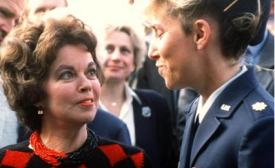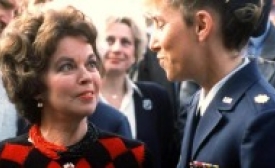ambassadors
A recording has surfaced online purporting to be a leaked conversation between two Russian ambassadors discussing which parts of the world they would like to annex after Crimea.

I’m a Shirley Temple fan. Not a big fan of her movies; they seemed more suited for my sister. I’m a fan of her diplomacy in Czechoslovakia. I was a Newsweek reporter living in Prague between the 1989 “Velvet Revolution” and 1991 when I saw up close how Ambassador Shirley Temple Black worked it. That’s how I became a fan. (Disclosure: I like ambassadors, my wife was U.S. ambassador to Hungary 2010-13.)
America has had many notable diplomats dealing with Czechoslovakia, or the more modern Czech Republic, a country split from Slovakia in 1993 following a “Velvet Divorce.”
Shirley Temple Black’s career speaks to the inherent power of cultural diplomacy to move people in positive ways. As perhaps the biggest child movie star in history, she made magic with her dance and voice—and her talent echoed around the world as did her powerful films which made America look vibrant and culturally robust. In many ways she made America into the great “fairy tale” it could be—a nation beckoning others with its openness and warmth.

Her personal and informal style worked well with the new government, made up of formerly imprisoned, hard laboring and human rights Charter 77-signing artists, musicians, actors and a playwright president named Vaclav Havel.
A conversation between a State Department official and the U.S. ambassador to Ukraine posted on YouTube revealed a frank exchange on U.S. strategy for a political transition in that country, including a crude swipe at the European Union.
In 1994, rumors circulated that President Bill Clinton would nominate James Hormel, the openly gay American philanthropist, to the post of U.S. ambassador to Fiji. While the reason Hormel was not nominated was never clear, some argued that the White House did not pursue his nomination because the Fijian Penal Code criminalized homosexuality at the time.
In 2010, a French Ambassador posted in the Caucasus explained to me proudly that he was one of the first diplomats from the Quai d’Orsay to run a Facebook account. Two years later, the US Ambassador in Moscow, Michael McFaul, astonished the diplomatic community and Russia by engaging directly with the Russian population. With 55,000 followers on Twitter, he embodied the e-diplomacy revolution.







